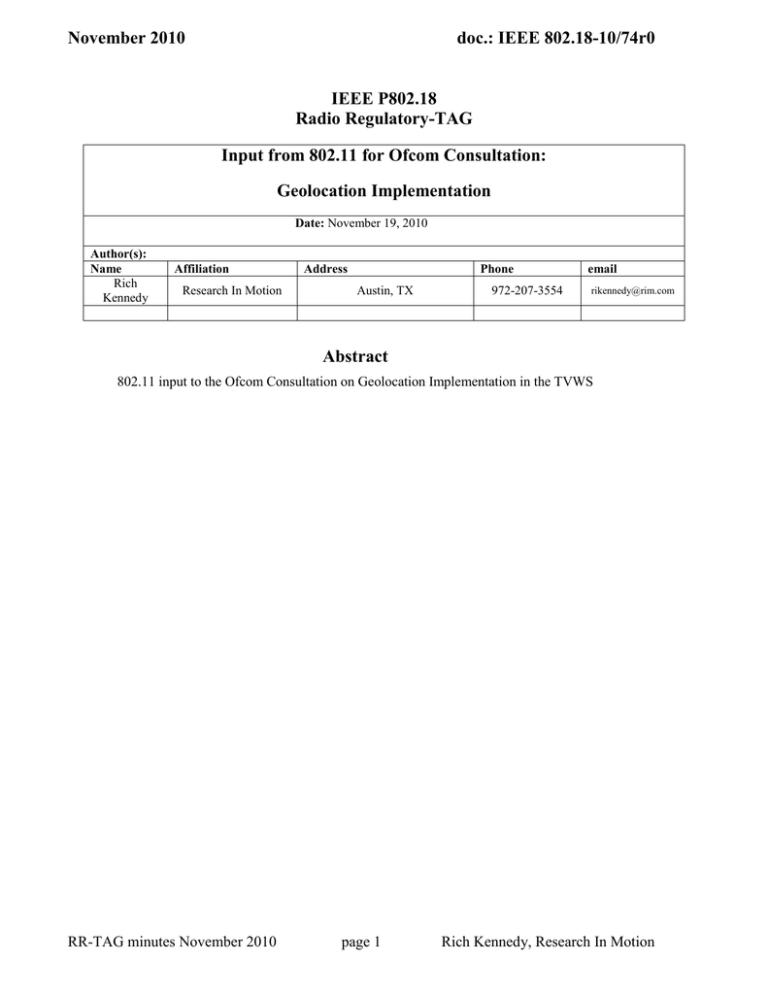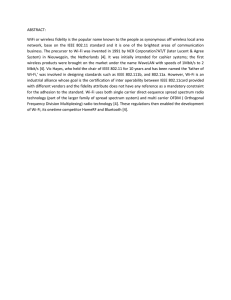November 2010 doc.: IEEE 802.18-10/74r0 IEEE P802.18
advertisement

November 2010 doc.: IEEE 802.18-10/74r0 IEEE P802.18 Radio Regulatory-TAG Input from 802.11 for Ofcom Consultation: Geolocation Implementation Date: November 19, 2010 Author(s): Name Rich Kennedy Affiliation Research In Motion Address Phone Austin, TX 972-207-3554 email rikennedy@rim.com Abstract 802.11 input to the Ofcom Consultation on Geolocation Implementation in the TVWS RR-TAG minutes November 2010 page 1 Rich Kennedy, Research In Motion November 2010 doc.: IEEE 802.18-10/74r0 Q1: What are your views on the likely use and take-up of WSDs? Do you intend to participate in this area, for example by hosting a pilot or developing equipment? [paragraphs 2.15 to 2.49] The IEEE 802.11 standard has been an extremely successful application of unlicensed wireless networking. Today, the cellular industry has recognized the importance of this technology as a way to offload data traffic that threatens to congest their networks, and nearly universally adopted Wi-Fi as a way to alleviate this problem, thereby driving enormous volumes of deployed Wi-Fi devices and threatening to offload the congestion as well. Unlicensed spectrum is the key driver of Wi-Fi, and the TV White Spaces is today’s opportunity to expand its use and minimize the affects of the impending congestion issues. The extended range, even at reduced transmit power, and ability to penetrate interior walls and other obstacles makes this specific spectrum the ideal space for the home and office environments, where 2.4 and 5 GHz have failed to provide the coverage needed for audio/video streaming as well as cellular traffic offload. Q2: Are these appropriate conditions for licence exempting the WSDs? [paragraphs 4.2 to 4.4] We appreciate the considerable and carefully considered efforts of Ofcom to evaluate the need for additional licence-exempt spectrum, and to properly assess the opportunities for sharing the under-utilised RF spectrum. IEEE 802.11 technology owes its huge success, to where the term has become synonymous with wireless internet access, to regulatory understanding of its place in the overall wireless broadband picture. We believe that the provisions of Section 4 not only have correctly specified how this can be done today with proper protection of the licenced operators in the band, but also support possible future enhancements to improve licence-exempt utilization efficiency in this and possibly other under-utilised bands. Q3: Is the lack of European harmonised standards problematic for development of WSDs? IEEE 802 recognizes that the lack of spectrum harmonization is a serious issue for mass market manufacturers, presenting production, distribution and stocking complexities. However, this has always been the case in the bands that Wi-Fi calls home. In the 2.4 GHz band, available channel lists and transmit power limitations vary, literally all over the map. The 5 GHz bands are even worse, with different countries adopting all, some or none of the four main bands, with or without DFS requirements and varied transmit characteristics. RR-TAG minutes November 2010 page 2 Rich Kennedy, Research In Motion November 2010 doc.: IEEE 802.18-10/74r0 Although we would prefer a globally harmonized standard for the TVWS we understand the difficulties; the legacy TV broadcasters and device manufacturers had to deal with this from the start. Due to the importance of this additional license-exempt spectrum, the IEEE 802 together with the Wi-Fi Alliance will make every effort to drive towards harmonization, but at the same time will work with IEEE 802.11 to generate standards that will manage the differences. Q4: Do you have any comments on these [database] requirements? Are there any other requirements that should be placed on the database? [paragraphs 5.4 to 5.9] As this question refers to requirements placed on database operators, IEEE 802 will not comment. Q5: Do you have any comments on these [database] responsibilities? [paragraphs 5.10 and 5.11] As this question refers to requirements placed on database operators, IEEE 802 will not comment. Q6: Might you be interested in becoming a database provider? If so, can you provide more details on the extent and timing of likely provision? [paragraphs 5.10 and 5.11] Companies affiliated with IEEE 802 participants primarily provide Wi-Fi products and services, and do not anticipate that any will venture to become database operators. It is however possible, that as Wi-Fi in the TVWS becomes a reality, database operators participate in IEEE 802 and will become members of the Wi-Fi Alliance. Q7. Is our approach of working with Europe where possible but moving ahead alone if no European approach appears forthcoming appropriate or should we await European harmonisation regardless of how long this might take? [paragraphs 6.1 to 6.5] As stated in our answer to Question 3, due to the importance of this additional license-exempt spectrum, IEEE 802.18 and the Wi-Fi Alliance will make every effort to drive towards harmonization, but at the same time will work with IEEE 802.11 to generate standards that will manage the differences. We believe that regulators that move ahead now will most likely provide the direction for future efforts in the TVWS. Working with IEEE 802.11 (P802.11af) to lead the develop technical standards and interoperability, the Wi-Fi Alliance wishes to encourage Ofcom to provide that leadership on the regulatory side. RR-TAG minutes November 2010 page 3 Rich Kennedy, Research In Motion November 2010 RR-TAG minutes November 2010 doc.: IEEE 802.18-10/74r0 page 4 Rich Kennedy, Research In Motion
